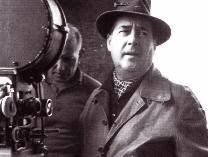
Filmography
Dafne (short, 1936)
Prelude a l'apres midi d'un faune (lost film, 1937)
La vispa Teresa / Lively Teresa (short, 1939)
Il tacchino prepotente / The Bullying Turkey (short, 1939)
Fantasia sottomarina / Undersea Fantasy (short, 1940)
Il ruscello di Ripasottile / The Brook of Ripa Sottile (short, 1941)
Un pilota ritorna / A Pilot Returns (1942)
La nave Bianca / The White Ship (1942) Legocart (R2 IT)
L'uomo dalla croce / The Man with the Cross (1943)
Roma, citta aperta / Rome, Open City (1945) Image (R1) / Arrow (R2 UK) Films sans Frontieres (R2 FR) / IVC (R2 JP) / Versatil (R4 BR) / Criterion (R1)
Desiderio / Desire (1946)
Paisa / Paisan (1946) Ventura (R1) double feature w/Two Women / Films sans Frontieres (R2 FR) / IVC (R2 JP) / Versatil (R4 BR) / Criterion (R1)
L'amore / Ways of Love (segment, 1948) IVC (R2 JP)
Germania anno zero / Germany Year Zero (1948) Image (R1) / Films sans Frontieres (R2 FR) / IVC (R2 JP) / Criterion (R1)
Stromboli (1950) Films sans Frotieres (R2 FR) / Versatil (R4 BR) / IVC (R2 JP)
Francesco, giullare di Dio / The Flowers of St. Francis (1950) Criterion (R1) / MoC (R2 UK) / Medusa (R2 IT) / Kinokuniya (R2 JP)
Les sept peches capitaux / The Seven Deadly Sins (segment, 1952) IVC (R2 JP)
La macchina ammazzacattivi / Machine to Kill Bad People (1952) IVC (R2 JP)
Europa 51 / The Greatest Love (1952) Imagica (R2 JP)
Siamo donne / We, the Women (segment, 1953)
Amori di mezzo secolo / Mid-Century Loves (segment, 1954)
Dove la liberta? / Where Is Freedom? (1954) Lionsgate R1
Viaggio in Italia / Journey to Italy (1954) BFI (R2 UK) / Films sans Frontieres (R2 FR) / Versatil (R4 BR) / IVC (R2 JP)
La paura / Fear (1954) IVC (R2 JP)
Giovanna d'Arco al rogo / Joan at the Stake (1954) IVC (R2 JP)
L'India vista da Rossellini (TV series, 1959) IVC (R2 JP)
Il Generale della Rovere / General della Rovere (1959) Minerva Classics (R2 IT) w/subs / Criterion R1
Era notte a Roma / Blackout in Rome (1960) Suevia Films (R2 ES) / Lionsgate R1 / Optimum (R2 UK)
Torino nei cent'anni (TV, 1961)
Viva l'Italia! / Garibaldi (1961)
Vanina Vanini / The Betrayer (1961)
Anima nera (1962)
RoGoPaG (segment, 1963) Imagica (R2 JP) / Tartan (R2 UK) (Part of Pasolini Volume 1 collection)
L'eta del ferro / The Iron Age (TV, 1964)
La prise de pouvoir par Louis XIV / The Rise of Louis XIV (TV, 1966) mk2 (R2 FR) / Criterion R1
Idea di un'isola (TV, 1967)
Atti degli apostoli / Acts of the Apostles (TV series, 1969)
Da Gerusalemme a Damasco (1970)
Rice University (1971)
Intervista a Salvador Allende: La forza e la ragione (1971)
Socrate / Socrates (TV, 1971) Istituto Luce (R2 IT)
Blaise Pascal (TV, 1972) Eclipse (Criterion) R1
Agostino d'Ippona / Augustine of Hippo (1972)
L'eta di Cosimo de Medici / The Age of the Medici (TV, 1973) Eclipse (Criterion) R1
Cartesius / Descartes (TV, 1974) Istituto Luce (R2 IT) / Eclipse (Criterion) R1
Anno uno / Year One (1974) Istituto Luce (R2 IT)
Il Messia / The Messiah (1975) San Paolo (R2 IT)
Beaubourg, centre d'art et de culture Georges Pompidou / Beaubourg (1977)
Concerto per Michelangelo (TV, 1977)
Forum Discussions
Dubbing in Italian Cinema
More Rossellini?
The Neo-Realist Collection (Arrow)
Roberto Rossellini on DVD
Web Resources
Beginning Again from Zero: Post-War Reconstruction - Megan Carrigy (Senses of Cinema, 2003)
Germany Year Zero - Tina Marie Camilleri (Senses of Cinema, 2000)
Making Reality - Tag Gallagher (Senses of Cinema, 2004)
On Giovanna d'Arco al rogo - Tag Gallagher (Screening the Past, 2000)
Re-evaluating Rossellini - Martin Walsh (Jump Cut, 1977)
The Rise To Power Of Louis XIV - Derek Malcolm (The Guardian, 1999)
Roberto Rossellini - Hugo Salas (Senses of Cinema, 2002)
Roberto Rossellini - Michael E. Grost (Classic Film and Television)
Roberto Rossellini - Acquarello (Strictly Film School, 2000-2003)
Strombol - John Flaus (Senses of Cinema, 2000)
Volcano Girl: Stromboli - Fred Camper (Chicago Reader, 2000)
Books
The Adventures of Roberto Rossellini - Tag Gallagher (Da Capo Press, 1998)
The Films of Roberto Rossellini - Peter Bondanella (Cambridge University Press, 1993)
In the Name of the Father, The Daughter, And The Holy Sprirts: Remembering Roberto Rossellini - Isabella Rossellini (Schirmer/Mosel, 2006)
Roberto Rossellini: Magician of the Real - David Forgacs, Sarah Lutton & Geoffrey Nowell-Smith editors (BFI, 2001)
Roberto Rossellini's Rome Open City - Sidney Gottlieb, editor (Cambridge University Press, 2004)